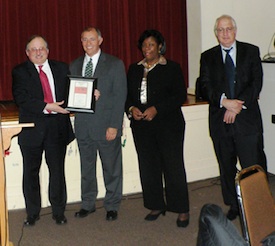International Statement 2010
Search
2008 Award Ceremony

From left: Dennis Frado, Lutheran Office for World Community; Martin Rendon, U.S. Fund for UNICEF; Sullivan Robinson, Trinity Development Corporation and former executive director, Congress of National Black Churches, and Arnold Kohen, international coordinator, Global Priorities Campaign.
History
International Statement 2010
An international statement in 2010 was endorsed by the Vatican, The Lutheran
Global Security Priorities Resolution Event Material
Enclosed are documents from the Global Security Priorities Resolution meeting held Feb. 7,
A Marshall Plan For The Third World
WITH the international donors conference for millions of earthquake victims in Kashmir
An international statement in 2010 was endorsed by the Vatican, The Lutheran World Federation and the World Council of Churches.
International Statement
Global Priorities Initiative
A new international initiative, Global Priorities, links nuclear disarmament and non-proliferation to a wider set of objectives. It reframes the challenge of disarmament by connecting cuts in nuclear weaponry to the well-being of the world’s children, thereby redoubling global efforts to address child hunger, health and education.
The 2010 Review Conference of the Parties to the Treaty on the Non-Proliferation of Nuclear Weapons (NPT) in New York underscored the need to create a global compact reaching across political divisions and involving civil society. Deep cuts in nuclear arsenals offer an opportunity to create additional funding at this time of economic uncertainty to address needs that have been neglected over many years. These cuts must be pursued both to enhance international security and to improve global child survival and the well-being of future generations.
For the past twenty-five years, political leaders have urged drastic reductions in the nuclear arsenals of the U.S. and the Russian Federation, starting in 1986 when Presidents Reagan and Gorbachev came close to agreeing on the elimination of nuclear arms. A current bipartisan U.S. Congressional measure, H. Res. 278, the Global Security Priorities resolution, introduced by Democratic Representative Jim McGovern and Republican Representative Dan Lungren, argues for an intermediate reduction in U.S. and Russian arsenals to 1,000 deployed nuclear warheads and a total of no more than 3,000 weapons on each side, to be achieved in the near future. Equally important, H. Res. 278 addresses the purposeful use of savings created by reductions in the nuclear arsenals.
After World War II, the Marshall Plan, an economic recovery initiative of the United States, not only rebuilt the lands of European allies but was extended to former enemies as well. In the pattern set by these efforts, H. Res. 278 and similar measures give us an opportunity to shift national and international priorities. Unmet human needs can be addressed with savings from the reduction of nuclear weapon inventories of the US, the Russian Federation and other nuclear powers. This can mitigate some of the root causes of violence and reduce
the reliance on nuclear weapons.
The annual costs of maintaining the US nuclear arsenal alone at present levels are estimated to be close to $50 billion. Even if a saving of only ten percent of that were to be achieved in the early years of reductions, this would create a significant source of income for child survival and human development programs. Connecting nuclear weapon reductions to the well-being of children throughout the world could help combat sympathy for terrorism while facilitating broader international collaboration among nuclear and nonnuclear nations. In poor nations, such as Somalia, Sudan, the Democratic Republic of the Congo, Yemen and Afghanistan, poverty and hunger are a scourge on
human development. A program directed at poor communities and fragile states, derived directly from savings brought about by deep cuts in nuclear inventories, would have a salutary impact on international peace and security.
A United Nations resolution would help set the stage for specific international measures of this nature in the years ahead. The resolution would establish a firm link between the reduction of nuclear arsenals and humanitarian efforts worldwide. Utilizing funds made available through disarmament, programs could be conducted through UNICEF and agencies doing similar work to address global child survival and related nutritional, health and educational needs of children.
Posted by admin on Wednesday, November 7th, 2012 @ 3:25PM
Categories: History Of The Campaign





